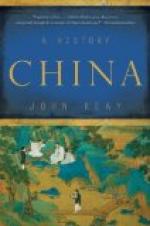For nearly three hundred years the southern empire had witnessed unceasing struggles between important cliques, making impossible any peaceful development within the country. Culturally, however, the period was rich in achievement. The court and the palaces of wealthy members of the gentry attracted scholars and poets, and the gentry themselves had time for artistic occupations. A large number of the best-known Chinese poets appeared in this period, and their works plainly reflect the conditions of that time: they are poems for the small circle of scholars among the gentry and for cultured patrons, spiced with quotations and allusions, elaborate in metre and construction, masterpieces of aesthetic sensitivity—but unintelligible except to highly educated members of the aristocracy. The works were of the most artificial type, far removed from all natural feeling.
Music, too, was never so assiduously cultivated as at this time. But the old Chinese music disappeared in the south as in the north, where dancing troupes and women musicians in the Sogdian commercial colonies of the province of Kansu established the music of western Turkestan. Here in the south, native courtesans brought the aboriginal, non-Chinese music to the court; Chinese poets wrote songs in Chinese for this music, and so the old Chinese music became unfashionable and was forgotten. The upper class, the gentry, bought these girls, often in large numbers, and organized them in troupes of singers and dancers, who had to appear on festal occasions and even at the court. For merchants and other people who lacked full social recognition there were brothels, a quite natural feature wherever there were considerable commercial colonies or collections of merchants, including the capital of the southern empire.
In their ideology, as will be remembered, the Chinese gentry were always in favour of Confucianism. Here in the south, however, the association with Confucianism was less serious, the southern gentry, with their relations with the merchant class, having acquired the character of “colonial” gentry. They were brought up as Confucians, but were interested in all sorts of different religious movements, and especially in Buddhism. A different type of Buddhism from that in the north had spread over most of the south, a meditative Buddhism that was very close ideologically to the original Taoism, and so fulfilled the same social functions as Taoism. Those who found the official life with its intrigues repulsive, occupied themselves with meditative Buddhism. The monks told of the sad fate of the wicked in the life to come, and industriously filled the gentry with apprehension, so that they tried to make up for their evil deeds by rich gifts to the monasteries. Many emperors in this period, especially Wu Ti of the Liang dynasty, inclined to Buddhism. Wu Ti turned to it especially in his old age, when he was shut out entirely from the tasks of a ruler and was no longer satisfied with the usual pleasures of the court. Several times he instituted Buddhist ceremonies of purification on a large scale in the hope of so securing forgiveness for the many murders he had committed.




